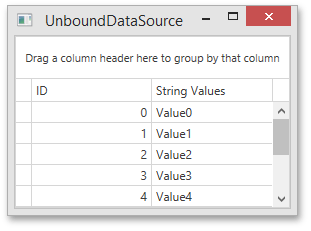UnboundDataSource Class
A data source used to supply and obtain a typed list of objects to DevExpress controls.
Namespace: DevExpress.Xpf.Core.DataSources
Assembly: DevExpress.Xpf.Core.v21.2.dll
NuGet Package: DevExpress.Wpf.Core
Declaration
Remarks
Use the UnboundDataSource to bind DevExpress controls to a data source when no strongly typed data set is available at compile time.
The following image illustrates the basic functionality of the UnboundDataSource component:

Map the UnboundDataSource to Data
To map the UnboundDataSource to data, populate the UnboundDataSource.Properties collection with UnboundDataSourceProperty objects. Each UnboundDataSourceProperty object identifies a data source field.
Use the following properties to associate an UnboundDataSourceProperty object with a data source field:
|
property | Description |
|---|---|
Specifies the name of the property. | |
Specifies the display name of the property. | |
Specifies the type of the property. |
The following example demonstrates an UnboundDataSource with two columns. Users can edit the Numbers column values with the SpinEdit editor.
<Window ...
xmlns:dx="http://schemas.devexpress.com/winfx/2008/xaml/core"
xmlns:dxg="http://schemas.devexpress.com/winfx/2008/xaml/grid">
<Window.Resources>
<dx:UnboundDataSource x:Key="UnboundDataSource" Count="100">
<dx:UnboundDataSource.Properties>
<dx:UnboundDataSourceProperty DisplayName="ID" Name="Numbers" PropertyType="{x:Type sys:Int32}"/>
<!-- UnboundDataSourceProperty.DisplayName property specifies the default column header -->
<dx:UnboundDataSourceProperty DisplayName="String Values" Name="Strings" PropertyType="{x:Type sys:String}"/>
</dx:UnboundDataSource.Properties>
</dx:UnboundDataSource>
</Window.Resources>
<Grid>
<dxg:GridControl AutoGenerateColumns="AddNew" EnableSmartColumnsGeneration="True" ItemsSource="{Binding Data, Source={StaticResource UnboundDataSource}}">
<!-- UnboundSourceProperty.Name value is used to specify the field name -->
<dxg:GridColumn FieldName="Numbers" Header="ID">
<dxg:GridColumn.EditSettings>
<dxe:SpinEditSettings/>
</dxg:GridColumn.EditSettings>
</dxg:GridColumn>
<dxg:GridControl.View>
<dxg:TableView AllowPerPixelScrolling="True" ShowTotalSummary="True"/>
</dxg:GridControl.View>
</dxg:GridControl>
</Grid>
</Window>
Transfer Data Between Client and Source
Handle the following events to transfer data between the client and the data source:
| Event | Description |
|---|---|
| UnboundDataSource.ValueNeeded | Occurs each time an item is pulled from the data source. |
| UnboundDataSource.ValuePushed | Occurs each time the modified data is pushed to the data source. |
Note
When a data-aware control is initially populated with data, the UnboundDataSource.ValueNeeded event fires each time a value is pulled from the data source.
For example, if you set the row count to 10 and the UnboundDataSource.Properties collection contains 2 UnboundDataSourceProperty objects, the UnboundDataSource.ValueNeeded event will occur 20 times.
The following example demonstrates the UnboundDataSource linked to the ViewModel class that contains sample data.
<Window ...
xmlns:dx="http://schemas.devexpress.com/winfx/2008/xaml/core"
xmlns:dxg="http://schemas.devexpress.com/winfx/2008/xaml/grid">
<Window.Resources>
<dx:UnboundDataSource x:Key="UnboundDataSource" Count="100" ValueNeeded="UnboundDataSource_ValueNeeded" ValuePushed="UnboundDataSource_ValuePushed">
<dx:UnboundDataSource.Properties>
<dx:UnboundDataSourceProperty DisplayName="ID" Name="Numbers" PropertyType="{x:Type sys:Int32}"/>
<dx:UnboundDataSourceProperty DisplayName="String Values" Name="Strings" PropertyType="{x:Type sys:String}"/>
</dx:UnboundDataSource.Properties>
</dx:UnboundDataSource>
</Window.Resources>
<Grid>
<dxg:GridControl AutoGenerateColumns="AddNew" EnableSmartColumnsGeneration="True" ItemsSource="{Binding Data, Source={StaticResource UnboundDataSource}}">
<dxg:GridControl.View>
<dxg:TableView AllowPerPixelScrolling="True" ShowTotalSummary="True"/>
</dxg:GridControl.View>
</dxg:GridControl>
</Grid>
</Window>
public class ViewModel {
//Each data cell is identified by a list index and key value.
//The key is a string that specifies the column name.
public List<Dictionary<string, object>> Data { get; set; }
public ViewModel() {
CreateList();
}
//Populates the list with sample data.
void CreateList() {
Data = new List<Dictionary<string, object>>();
//Creates 1000 rows
for (int i = 0; i < 1000; i++) {
Data.Add(CreateDictionary(i));
}
}
//Each dictionary object is a data row.
//Each dictionary item is a cell value. It stores a string (column name) and a value (cell value).
Dictionary<string,object> CreateDictionary(int i) {
Dictionary<string, object> dict = new Dictionary<string, object>();
//Specifies the value in the "Strings" column
dict.Add("Strings", "Value" + i.ToString());
//Specifies the value in the "Numbers" column
dict.Add("Numbers", i);
return dict;
}
}
public partial class MainWindow : Window {
public MainWindow() {
vm = new ViewModel();
DataContext = vm;
InitializeComponent();
}
//Processes the pull operation
private void UnboundDataSource_ValueNeeded(object sender, DevExpress.Data.UnboundSourceValueNeededEventArgs e) {
var index = e.RowIndex;
if(e.PropertyName == "Strings") {
e.Value = vm.Data[index]["Strings"];
}
if(e.PropertyName == "Numbers") {
e.Value = vm.Data[index]["Numbers"];
}
}
//Processes the push operation
private void UnboundDataSource_ValuePushed(object sender, DevExpress.Data.UnboundSourceValuePushedEventArgs e) {
var index = e.RowIndex;
if(e.PropertyName == "Strings") {
vm.Data[index]["Strings"] = (string)e.Value;
}
if(e.PropertyName == "Numbers") {
vm.Data[index]["Numbers"] = (int)e.Value;
}
}
}
The following image demonstrates the result.

Example: Use the UnboundDataSource with Source Generator
The DevExpress MVVM Framework includes a source generator that produces boilerplate code for your View Models at compile time.
The following example illustrates how to use the UnboundDataSource with the source generator: